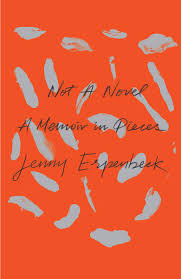Lucy Popescu at The Guardian:
 The essays explore the subjects – walls and borders, truth and silence, identity and memory and the limitations of language – present in her fiction while her autobiographical accounts give valuable context. Despite having slept through a nation’s collapse, Erpenbeck swiftly realised: “Everything that had been called the present up until then was suddenly called the past.” And so she erected another border inside herself, “made of time, between the first half of my life which was transformed into history by the fall of the wall… and the second half, which began at that same moment”. She clearly enjoyed a happy childhood. In John we learn about the lovesick schoolboy who would phone her and, refusing to reveal his identity, would quote Beatles lyrics. Years later, when Erpenbeck requested her file from the Stasi, she discovered that they had intercepted John’s daily record of who had arrived and left her apartment block. In Open Bookkeeping her mother’s death in 2008 is reduced to a poignant list of everything Erpenbeck has to find a home for, the accounts she has to close, the refunds that come in and those that don’t.
The essays explore the subjects – walls and borders, truth and silence, identity and memory and the limitations of language – present in her fiction while her autobiographical accounts give valuable context. Despite having slept through a nation’s collapse, Erpenbeck swiftly realised: “Everything that had been called the present up until then was suddenly called the past.” And so she erected another border inside herself, “made of time, between the first half of my life which was transformed into history by the fall of the wall… and the second half, which began at that same moment”. She clearly enjoyed a happy childhood. In John we learn about the lovesick schoolboy who would phone her and, refusing to reveal his identity, would quote Beatles lyrics. Years later, when Erpenbeck requested her file from the Stasi, she discovered that they had intercepted John’s daily record of who had arrived and left her apartment block. In Open Bookkeeping her mother’s death in 2008 is reduced to a poignant list of everything Erpenbeck has to find a home for, the accounts she has to close, the refunds that come in and those that don’t.
more here.
